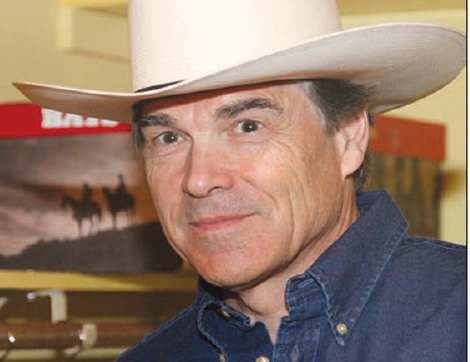
By Ralph Forbes
Picture the Marlboro Man riding out of the west, healthy, rugged and free . . . until you recall two of the iconic Marlboro men, Wayne McLaren and David McLean, died of lung cancer. Ironically, McLaren testified in favor of anti-smoking legislation, but the phony Madison Avenue icon lives on. But the deadliest Marlboro Man phony ad is the one that portrays politician Rick Perry as a cowboy. The ads are clearly rustling the Reagan brand and marketing it as his own.
Neighbors in his hometown of Paint Creek and Haskell County clearly think Perry is riding to power on a rustled horse with a false brand. Big city Texans agree. Perry has enjoyed lavish perks and travel, paid for by crony capitalists who have funded Perry’s jetting around the world, stays in luxury hotels and resorts, vacations in exclusive Colorado ski towns, expensive sporting events and concerts, at least nine hunting trips, entertainment—even paying the cable bill at the 4,600-square-foot mansion with a heated pool that the taxpayers are paying for—$8,500 a month. As the Houston Chronicle said, Perry’s “a long way from the cotton farm.”
Perry’s acceptance of such perks feeds a corrupt pay-to-play political culture in Texas. His campaign paid $426,000 last year to settle an opponent’s lawsuit alleging it accepted illegal contributions from a top donor.
According to an article by Kenneth P. Vogel in the Washington daily Politico, insurance company owner Phil Adams has contributed nearly $290,000 to Perry’s gubernatorial campaigns. Terrabon Inc., a company in which Adams invested, got $2.75 million from the Texas Emerging Technology Fund, a state economic development program overseen by Perry.
Perry’s trips to Israel are examples of his “extravagant lifestyle funded by secretive corporate contributions” which resulted in favors in return. The trip had been organized and partly funded by Irwin Katsof, an international energy financier and Israel backer, who also helped fund a 2007 Perry trip to Israel.
Doug Pitcock, a major Perry campaign contributor, who runs a road building firm that does millions of dollars in business with the state, revealed that he had loaned his plane to the governor to fly to Israel and wanted to donate the cost of the flight—$180,000—to Texas One (a privately funded “public/private partnership designed for economic development in Texas”) as an in-kind tax-deductible contribution.
Perry spokeswoman Catherine Frazier said the 2007 trip spurred the formation of the Texas-Israel Chamber of Commerce and “served as a catalyst to the governor’s support of Texas’s divestment from companies that do business with Iran.”
When Perry announced his run for the presidency in South Carolina, he began his speech: “I’m the product of a place called Paint Creek—doesn’t have a zip code.” (Its zip code is 79521.) He invoked images of his rural school, growing cotton and wheat, his mother sewing his clothes when he went off to college, his Boy Scout troop (No. 48) . . . “It’s a great place to grow up. . . .Wonderful people out there.”
Meanwhile, back on the farm, “I never saw him on a tractor in his life,” said one of Perry’s old neighbors, who requested anonymity. “And I never did see him on a horse.”
It’s no crime not to be a farmer—but it does show lack of character to pretend you are one. Wallar Overton, 72, Perry’s old Boy Scout troop leader, the one who awarded him his Eagle Scout badge, said he likely won’t be voting for him.
When Perry’s birthplace was devastated by a flood in 2004, Perry turned his back on Haskell, according to Haskell’s county judge, David C. Davis.
Don Ballard, the superintendent of the county’s school system, concurred with Davis. “It was pretty bad,” he said. “We lost a bunch of homes around the lake. . . .We had a lot of homes damaged,” but Perry didn’t send “any kind of aid.”
